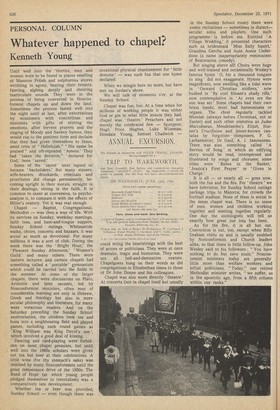PERSONAL COLUMN
Whatever happened to chapel?
Kenneth Young
Until well into the 'thirties, men and women were to be found in places smelling of Mansion Polish and sulphurous stoves writhling in agony, beating their breasts, fainting, sighing deeply and shouting inarticulate sounds. They were in the process of being converted in Noncon formist chapels up and down the land. Sometimes the process lasted well into the night until at last, after exhortations by missioners with concertinas and ministers with gifts of stirring the emotions, after fervent prayers and the singing of Moody and Sankey hymns, they would run to the penitent form and declaim that they had given themselves to Jesus, amid cries of " Hallelujah," " His name be praised " and oft-repeated ' Amens.' They had ' taken the decision," ' declared for God,' been saved.'
Some of the saved ' later lapsed or became ' backsliders.' But many sinners, wife-beaters, drunkards, criminals and prostitutes did change permanently, becoming upright in their morals, straight in their dealings, strong in the faith. It is common to sneer at conversion, to psychoanalyse it, to compare it with the effects of Hitler's oratory. Yet it was real enough.
Chapel — Baptist, Congregational, Methodist — was then. a way of life. With its services on Sunday, weekday meetings, faith teas, and ham-and-tongue suppers, Sunday School outings, Whitsuntide walks, choirs, concerts and bazaars, it was social as much as devotional. For many millions it was a sort of club. During the week there was the ' Bright Hour,' the 'Pleasant Sunday Afternoon," Women's Guild ' and many others. There were lantern lectures; and certain chapels had something called a ' portable' gymnasium which could be carried into the fields in the summer. At some of the larger chapels, there were discussions on Plato, Aristotle and later savants, led by Nonconformist ministers, often men of considerable learning not only in Hebrew, Greek and theology but also in more secular philosophy and literature, for many were voracious readers. And on the Saturday preceding the Sunday School anniversaries, the children took tea and buns into a neighbouring field and played games, including such round games as 'King William was King David's son ', which involved a good deal of kissing.
Dancing and card-playing were forbidden on most chapel premises, but until well into the 1860s scholars were given not tea but beer at their celebrations. A little wine (for thy stomach's sake) was imbibed by many Nonconformists until the great temperance drive of the 1850s. The Band of Hope (at which young people pledged themselves to teetotalism) was a comparatively late development.
Whether tea or beer was provided, Sunday School — even though there was occasional physical chastisement for 'little demohs ' — was such fun that one hymn declared: When we mingle here no more, but have met on Jordan's shore.
We will talk of moments o'er, at the Sunday School.
Chapel was fun, too. At a time when for millions of working people it was either God or gin in what little leisure they had, chapel was theatre.' Preachers and not merely the celebrated few — Spurgeon, Hugh Price Hughes, Luke Wiseman, Dinsdale Young, Samuel Chadwick
could wring the heartstrings with the best of actors or politicians. They were at once dramatic, tragic and humorous. They were not all hell-and-damnation orators. Chapelgoers hung on their words as did congregations in Elizabethan times to those of Dr John Donne and his colleagues.
Chapel was also more directly 'theatre.' At concerts (not in chapel itself but usually in the Sunday School room) there were comic recitations — sometimes in dialect— secular solos and playlets. One such programme is before me. Entitled 'A Village Wedding,' it presented characters such as bridesmaid Miss Sally Squirt,' Grandma Gercha and Aunt Annie Underdone (a name inappropriately reminiscent of Restoration comedy),
But singing above all! Choirs were huge and well-trained and occasionally Wesley's famous hymn 0, for a thousand tongues to sing' did not exaggerate. Hymns were magnificent, now swelling like a tidal wave in ' Onward Christian soldiers,' now hushed in ' By cool Siloam's shady rills,' now contemplative in 'At even ere the sun was set.' Some chapels had their own brass bands; most had harmoniums or organs. The choir regularly tackled Messiah (always before ChristmaA, not at Easter) and such other oratorios as Judas Maccabaeus, Mendelssohn's Elijah, ,Stainer's Crucifixion and lesser-known cantatas by forgotten composers, P. G. Larbaslestier, Dr Gaul, A. J. Jamouneau. There was also something called 'A Service of Song' in which an edifying story would be read, interspersed and illustrated by songs and choruses; some titles were ' Babes in the Basket,' 'Jessica's First Prayer' or Given in Charge.'
It is all — or nearly all — gone now, both the fun and the fire. For ' theatre ' we have television; for Sunday School outings package trips to Majorca; for crowds the football stadium. None of them is social in the sense chapel was. There is no sense of men, women and children working together and meeting together regularly. One day the sociologists will tell us exactly how great our loss has been.
As for the fire, it is all but out. Conversion is out, too, except when Billy Graham visits us and is usually snubbed by Nonconformist and Church leaders alike, so that there is little follow-up. John Wesley said to his followers : "You have nothing to do but save souls." Noncon'ormist ministers today are generally little more than welfare workers and leftist politicians. " Today," one retired Methodist minister writes, " we suffer, as in the apostolic age, from a fifth column within our ranks."










































 Previous page
Previous page